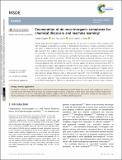Enumeration of de novo inorganic complexes for chemical discovery and machine learning
Author(s)
Gugler, Stefan; Janet, Jon Paul; Kulik, Heather J.
Downloadc9me00069k.pdf (3.061Mb)
Terms of use
Metadata
Show full item recordAbstract
Vapor phase deposition is typically used to apply thin films and coatings onto solid substrates. Deposition of materials onto liquid substrates provides complexity due to surface tension, viscosity, and solubility effects. Understanding the interactions between the deposited material and the liquid substrate can lead to the formation of materials with new structures and compositions. In this review, we will discuss the interactions associated with initiated chemical vapor deposition of polymers onto liquid substrates including silicone oils and ionic liquids. We will provide guidelines for selecting liquid properties to control the formation of polymer particles, films, and gels. We will conclude by discussing recent work on combining polymer and metal deposition to create hybrid organic/inorganic structures and actively moving the liquid during polymer deposition. ©2019
Date issued
2019-09Department
Massachusetts Institute of Technology. Department of Chemical EngineeringJournal
Molecular Systems Design & Engineering
Publisher
Royal Society of Chemistry (RSC)
Citation
Gugler, Stefan, Jon Paul Janet, and Heather J. Kulik, "Enumeration of de novo inorganic complexes for chemical discovery and machine learning." Molecular Systems Design & Engineering 2020, 1 (2019): p. 139-52 doi 10.1039/c9me00069k ©2019 Author(s)
Version: Final published version
ISSN
2058-9689